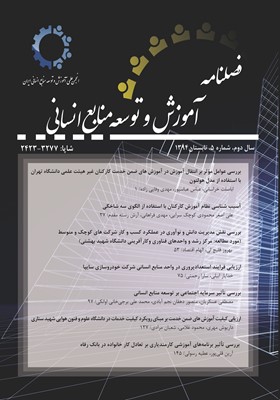ارزیابی کیفیت آموزشهای ضمن خدمت بر مبنای رویکرد کیفیت خدمات در دانشگاه علوم و فنون هوایی شهید ستاری
محورهای موضوعی :داریوش مهری 1 , محمود غلامی 2 , شعبان مرادی 3
1 - دانشگاه شهید بهشتی
2 -
3 -
کلید واژه: ارزیابی آموزش ضمن خدمت رویکرد کیفیت خدمات کیفیت آموزش,
چکیده مقاله :
در قرن بیست و یکم به موازات توسعه کمی نظامهای آموزشی مسأله کیفیت آموزش مطرح شده است. بهبود مستمر کیفیت آموزش ضمن خدمت کارکنان از ضروریات ارتقای قابلیت رقابت در مؤسسات آموزشی محسوب میشود. پژوهش حاضر با هدف ارزیابی کیفیت آموزشهای ضمن خدمت بر مبنای رویکرد کیفیت خدمات با روش توصیفی- همبستگی انجام گرفته است. جامعه آماری این پژوهش، 140 نفر از شرکتکنندگان دورههای آموزشی در دانشگاه علوم وفنون هوایی شهید ستاری بودند که بین 92 نفر از آنان که به شیوه تصادفی ساده انتخاب شدند، پرسشنامه توزیع گردید. دادههای به دست آمده با آزمونهای آماری تی تک نمونهای، همبستگی پیرسون و فریدمن مورد تجزیه و تحلیل قرار گرفت. نتایج پژوهش نشان داد کیفیت مؤلفههای گوناکون آموزش ضمن خدمت از دیدگاه فراگیران در حد مطلوبی قرار دارد و بین کیفیت کلی دورههای آموزشی و مؤلفههای آن و رضایت شرکتکنندگان از آموزشها همبستگی مثبت و معنیداری وجود دارد. از میان عوامل مؤثر بر کیفیت آموزش ضمن خدمت، کادر اداری از نظر پاسخدهندگان مهمترین عامل بوده است.
In the twenty-first century along with the development of educational systems, the subject of education quality has been raised as an issue. Continuous improvement in the quality of staffs’ in-service training, is an essential factor in improving the competitiveness of educational institutions. Based on the quality of services approach, this study aims to assess the quality of in-service training using cross-correlation method. As for the statistical population of this study, 140 participants of training courses in Shahid Sattari University of Science and Technology were selected. Using a simple random sampling method, 92 people from these participants have been selected to receive questionnaire. The obtained data were analyzed using single-sample T-student test and Pearson and Friedman correlation methods. The results indicated that from learners’ perspective, the various components of in-service training seemed eligible and there was a meaningful and positive correlation between the satisfactions of participants from training with the overall quality of training and training’s components. Among the factors affecting the in-service training, the respondents chose staff as the most important factor.


